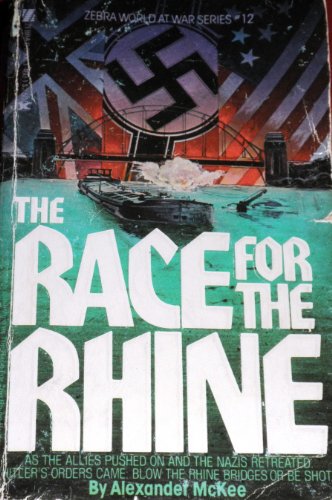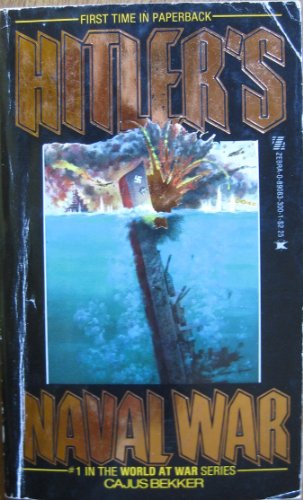zebra books kensington publishing corp new york n y (2 results)
Product Type
- All Product Types
- Books (2)
- Magazines & Periodicals
- Comics
- Sheet Music
- Art, Prints & Posters
- Photographs
- Maps
-
Manuscripts &
Paper Collectibles
Condition
- All Conditions
- New
- Used
Binding
- All Bindings
- Hardcover
- Softcover
Collectible Attributes
- First Edition
- Signed
- Dust Jacket
- Seller-Supplied Images
- Not Printed On Demand
Seller Location
Seller Rating
-
The Race for the Rhine Bridges
Published by Zebra Books [Kensington Publishing Corp.], New York, N.Y., 1980
ISBN 10: 0890834601ISBN 13: 9780890834602
Seller: Ground Zero Books, Ltd., Silver Spring, MD, U.S.A.
Book
Mass market paperback. Condition: Good. Second Printing,[stated]. [2], 490, [4] pages. Illustrations. List of Witnesses: Sources. Index, Cover has some wear and soiling. During World War II there were three great Rhine campaigns, the last of which was the Allies' final push for victory and the Germans' last hope of resistance. As the Germans lost ground, the inevitable order came to blow the bridges behind them. Hitler ordered that any officer who failed to blow a bridge in time was to be shot. But he complicated the difficult decision by adding that anyone who blew a Rhine bridge too early was to be shot, too. Also includes sources and index. Alexander Paul Charrier McKee OBE (25 July 1918 - 22 July 1992) was a British journalist, military historian, and diver who published nearly thirty books. In the Second World War, McKee served in the British Army and wrote war poetry. After the War he served with the British Army on the Rhine (BAOR). He wrote articles for the BAOR newspaper Polar Bear News and became a writer and producer for the British Forces Network in Germany. After demobilization, McKee became the editor of Conveyor magazine and wrote plays for BBC radio. Next, McKee decided to concentrate on documentary authorship, publishing some 27 books during his life. This work was a main selection of the Military Book Club. Derived from a Kirkus review: On the Western Front, World War II began and ended with the contest for the Rhine Delta, the "anthology of bridges" which commanded the strategic waterways of Belgium and Holland. In May, 1940 Hitler used the "Trojan Horse" -- airborne troops dropped to seize key bridgeheads -- in the blitzkrieg through the Lowlands. In March, 1945 the Allies reversed the operation and crossed the bridges the other way. Lucidly, with a minimum of heroics, McKee has recreated the action, complete with dead cows and fleeing civilians, and centered it on the luckless, thrice-assaulted town of Arnhem. "An army advance is basically a traffic problem and a river-crossing basically a bridging and rafting problem. . . even the dramatic arrival-of soldiers from the sky is mainly an air marshalling and organization problem." The ill-coordinated Allied operations contrast unfavorably with the high precision and imaginative deployment of troops achieved by the Luftwaffe, and the American generals, wing for glory, come in for some raps. This certainly adds to an overall understanding of the War and this specialized history will undoubtedly get a Big Bang from all the mined bridges.
-
Hitler's Naval War
Published by Zebra Books, Kensington Publishing Corp, New York, N.Y., 1978
ISBN 10: 0356045080ISBN 13: 9780356045085
Seller: Ground Zero Books, Ltd., Silver Spring, MD, U.S.A.
Book
Mass market paperback. Condition: Good. Third printing [stated]. 400 pages. Some cover wear. Some edge and page soiling and discoloration. Previous owner's stamp inside front cover. Slightly cocked. Includes List of Plates and Preface, as well as Appendices, Bibliography, and Index. Chapters include The Early Offensive; Norwegian Gamble; Pyrrhic Victory; The Battle of the Mediterranean, The Fall of Grand-Admiral Raeder; Climax in the Atlantic, and The End of the German Navy. Also includes Appendices, Bibliography, and Index. This is #1 in the World at War Series. Strange as it may seem, no reliable and yet popular history of the German Navy during the Second World War has appeared since the German war records were returned from London and became available to German historians and journalists. With such records now to hand, this book can report the highlights and decisive phases of the war at sea from the German point of view. Germany's defeat at sea was the one which irretrievably lost her the war. Efforts to suppress or forget our mistakes, though originally understandable, have succeeded only in cloaking personalities in a veil of "taboo'' quite contrary to German naval tradition. Erich Raeder, architect of the fleet that in 1939 had to be sent out to fight a war that it did not expect, once pronounced: "The deeds of the German Navy must be subjected to the full light of day." Cajus Bekker (born August 12, 1924 in Düsseldorf; ? March 10, 1975; actually Hans Dieter Berenbrok) was a German journalist and naval writer. Hans Dieter Berenbrok grew up in Hamburg and joined the Navy in 1943, where he served as a naval intelligence officer (radio officer) and at the end of the war held the rank of senior ensign. After the war, Berenbrok worked as a news editor and reporter for various newspapers and magazines. In 1953 he published his first book, Kampf und Untergang der Kriegsmarine, under the pseudonym Cajus Bekker. A documentary report in words and pictures, the content of which he had compiled from numerous private records and innumerable personal interviews, since German files were still in the custody of the victorious powers at the time. The book was distributed free of charge to 460 youth villages and youth homes in 1956 as part of a propaganda campaign by the Adenauer government, together with other works, in order to "promote the spirit of defense among young people and make them understand how the new German armed forces were included in the defense alliance of the Atlantic Community. " From 1955 Berenbrok was lecturer and editor for the marine program of Gerhard Stalling-Verlag, where he also remained active as the author Cajus Bekker. Berenbrok also used his reserve exercises (as Korvettenkapitän d. Res.) In the Federal Navy to deal with the German naval files returned by Great Britain in the Military History Research Office and in the Federal Military Archives in Freiburg. According to Jürgen Rohwer, Bekker saw his task in "making the achievements of our seafarers and aviators in the Second World War in front of the largest possible group of readers".



